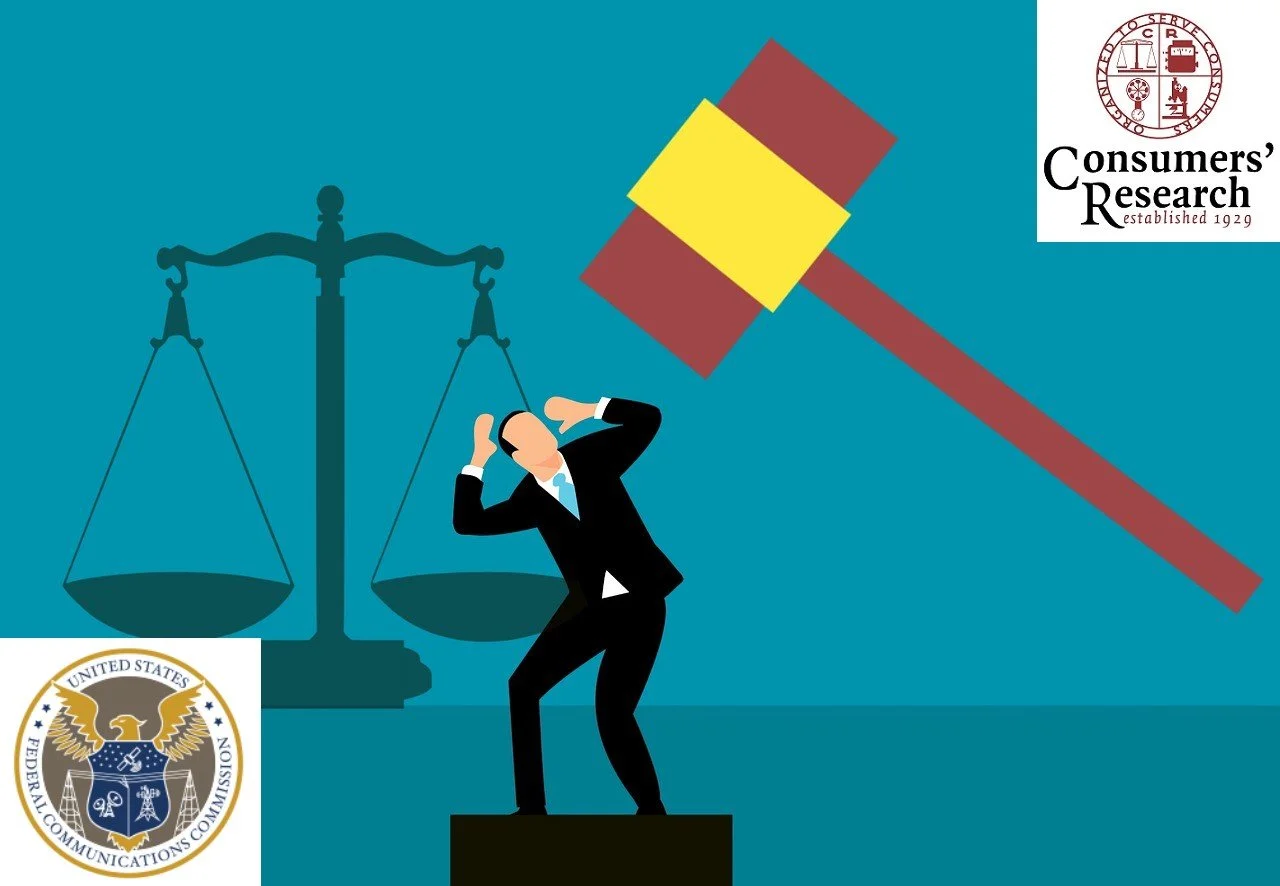Fifth Circuit Hears Oral Argument In Legal Challenge To USF Contributions – Consumers’ Research Moves Forward With Circuit Split Plot
March 24, 2023 – The U.S. Court of Appeals for the Fifth Circuit has denied the Consumers’ Research non-delegation doctrine challenge to the universal service fund and the way the USF is administered by the FCC.
December 5, 2022 – A three-judge panel of the U.S. Court of Appeals for the Fifth Circuit held an oral argument in Consumers’ Research v. FCC., a legal challenge to the Federal Communications Commission’s (FCC) actions approving the universal service fund (USF) contribution factor and the USF contribution factor for the first quarter of 2022.[1] An audio recording of the oral argument is available online for listening or download.
Consumers’ Research, a nonprofit organization,[2] along with communications provider Cause Based Commerce, Inc.[3] and 11 individuals filed their Petition For Review in January 2022. They want the Fifth Circuit to declare the FCC’s actions approving the USF contribution factor and the 1Q USF contribution factor itself unlawful, and set them aside.
The group has filed three separate petitions challenging three specific FCC approvals of the USF contribution factor, in three separate U.S. Courts of Appeals:
6th Circuit: Challenging USF contribution factor for the 4Q 2021; Case Number 21-3886 (filed September 30, 2021)
5th Circuit: Challenging USF contribution factor for the 1Q 2022; Case Number 22-60008 (filed January 5, 2022)
11th Circuit: Challenging USF contribution factor for the 4Q 2022; Case Number 22-13315 (filed October 3, 2022)
While Consumers’ Research is challenging three separate USF contributions factors, it is really challenging the fundamental, underlying constitutionality of the application of the USF contribution rules.[4] Consumer’s Research claims the USF revenue-raising structure violates the nondelegation doctrine. In each legal challenge, the Consumers’ Research group claims that Section 254 constitutes an unconstitutional delegation of Congress’ taxing power and that the FCC’s sub delegation of authority to the Universal Service Administrative Company (USAC), the FCC-designated administrator of the USF, is illegal.[5]
As is evident from the three separate petitions for review, Consumers’ Research is attempting to engineer a circuit split – a situation where any of these U.S. Courts of Appeals reach different conclusions, thereby forcing the U.S. Supreme Court to take up the Constitutional and nondelegation doctrine issues in the organization’s legal challenges.[6]
Consumers’ Research claims the USF system is largely a creature of the FCC, an administrative agency that is acting way outside the boundaries of Congress’ directive in Section 254. This runs parallel to like-minded critics that, for some time now, have been attacking what they perceive as the growing power of administrative agencies, claiming they usurp core legislative (and judicial) branch power in violation of the Constitution. A conservative leaning Supreme Court presents an opportunity to constrain (or eliminate) this power, if they are able to bring the right cases before it.
Many legal experts believe the Fifth Circuit may be friendly to Consumers’ Research’s constitutional arguments based on the Court’s decisions in a few recent cases. In an October 2022 opinion in Community Financial Services Association Of America V. Consumer Financial Protection Bureau, the Fifth Circuit ruled that the Consumer Financial Protection Bureau’s funding, which comes from the Federal Reserve, “contravenes the Constitution’s separation of powers.”[7] The Court said that because the CFPB receives funding directly from the Federal Reserve, Congress ceded its appropriations power. Citing The Federalist No. 58, the Court further stated that “[b]y abandoning its ‘most complete and effectual’ check on ‘the overgrown prerogatives of the other branches of the government’ – indeed, by enabling them in the Bureau’s case – Congress ran afoul of the separation of powers embodied in the Appropriations Clause.”
Other recent Fifth Circuit decisions that may indicate an amenable environment for Consumers’ Research’s USF contribution challenge include National Horsemen’s Benevolent and Protective Association v. Black[8] and NetChoice v. Paxton.[9] In National Horsemen’s, a nondelegation case, the Court applied “the settled constitutional principle that forbids private entities from exercising unchecked government power,” and declared the Horseracing Integrity and Safety Act “facially unconstitutional.” In NetChoice, the Court ignored long-standing First Amendment precedent, finding social media platforms have no First Amendment right of editorial discretion because they are common carriers.
At least one legal expert thinks Consumers’ Research v. FCC could reach the Supreme Court. Law school professor and nonresident senior fellow at the American Enterprise Institute, Daniel Lyons, thinks it’s possible SCOTUS would take the case if it makes it that far:
The petitioners’ challenge comes at a good time. The Court is increasingly interested in separation-of-powers questions and the importance of reining in an increasingly powerful administrative state. And the Fifth Circuit provides a good venue through which to tee up the issue for the Supreme Court…While this remains a difficult case to win, the stars seem to have aligned to give petitioners the best shot possible under existing case law. If they succeed, they will close a potentially dangerous loophole in the appropriations process and force Congress to revisit an outdated and unstable program.[10]
**********
[1] Consumers’ Research, et al v. FCC, Case Number 22-60008 (5th Cir., filed Jan. 5, 2022), https://dockets.justia.com/docket/circuit-courts/ca5/22-60008.
[2] The organization describes its mission as follows: “Consumers’ Research is an independent educational 501(c)(3) nonprofit organization whose mission is to increase the knowledge and understanding of issues, policies, products, and services of concern to consumers and to promote the freedom to act on that knowledge and understanding.” Consumers’ Research, About, Mission, https://consumersresearch.org/mission/.
[3] Cause Based Commerce helps “provide communications services to values-based consumers who want alternatives to the many companies and providers that support causes and positions contrary to their beliefs.” https://www.causebasedcommerce.com/.
[4] Comments of Mike Romano, Federal Society Teleforum, Consumers’ Research v. FCC and the Legality of the Universal Service Fund Contribution Regime, Transcript (July 19, 2022), https://fedsoc.org/events/consumers-research-v-fcc-and-the-legality-of-the-universal-service-fund-contribution-regime.
[5] Consumers’ Research argues that “[t]he FCC’s unfettered power to raise revenue under section 254 also runs afoul of the more-lenient modern interpretation of the nondelegation doctrine, which broadly permits an agency to undertake legislative action if Congress provided an “intelligible principle.” J.W. Hampton, Jr., & Co. v. United States, 276 U.S. 394, 409 (1928). Under that test, Congress still must “clearly delineate[]” the “boundaries of th[e] delegated authority.” Skinner v. Mid-Am. Pipeline Co., 490 U.S. 212, 214 (1989). Consumers’ Research, et al v. FCC, Case Number 22-60008, U.S. Court Of Appeals For The Fifth Circuit, Opening Brief For Petitioners, p. 35 (Apr. 11, 2022).
[6] See Of Counsel Cheryl Leanza Quoted in Communications Litigation Today, Article Addresses Consumers’ Research’s Challenges to FCC’s Universal Service Fund, BB&K In the News (Dec. 1, 2022), https://www.bbklaw.com/news-events/news-room/2022/in-the-news/12/of-counsel-cheryl-leanza-quoted-in-communications; Consumers’ Research USF Challenges Seek to “Manufacture a Split”: Experts, Communications Litigation Today, Communications Daily, Vo. 1, No. 32 (Nov. 28, 2022).
[7] Community Financial Services Association Of America V. Consumer Financial Protection Bureau, Case No. 21-50826 (5th Cir., Oct. 19, 2022), https://www.ca5.uscourts.gov/opinions/pub/21/21-50826-CV0.pdf.
[8] National Horsemen’s Benevolent and Protective Association v. Black, Case No. 22-10387 (5th Cir., Nov. 18, 2022), https://www.ca5.uscourts.gov/opinions/pub/22/22-10387-CV0.pdf.
[9] NetChoice v. Paxton, Case No. 21-51178 (5th Cir., Sep. 16, 2022), https://www.ca5.uscourts.gov/opinions/pub/21/21-51178-CV1.pdf.
[10] Daniel Lyons, Fifth Circuit to Hear Long-Overdue Constitutional Challenge to Universal Service Fund, AEIdeas (Nov. 21, 2022), https://www.aei.org/technology-and-innovation/fifth-circuit-to-hear-long-overdue-constitutional-challenge-to-universal-service-fund/.





